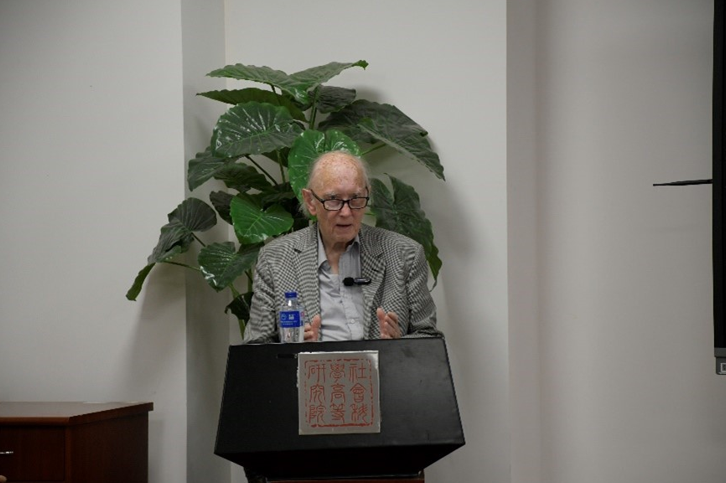The "World Social Science Advanced Lecture" (No. 78), organized by the Fudan Institute for Advanced Study in Social Sciences (Fudan IAS) and Contemporary China Research Center at Fudan University, was held on Sep 09, 2024, at Fudan University. John Dunn, emeritus professor of Department of Politics and International Studies (POLIS) in Cambridge University, life fellow of King's College,fellow of the British Academy and foreign member of the American Academy of Arts and Sciences, gave a lecture entitled A Life in the History of Political Thought and the Lessons it Teaches. The lecture was chaired by Prof. Sujian Guo, Dean and Distinguished Professor of Fudan IAS.
Prof. Guo first warmly welcomed Prof. Dunn, then introduced his main research areas and a series of achievements to the participants. Prof. Dunn expressed his gratitude to the invitation from Fudan IAS and said that in today's lecture he would try to explain some of the choices he made in his life and the reasons for them, and then began to share his experience, which included five main parts:
(1) The questions of a life before Cambridge
(2) Cambridge’s heritage in the history of political thought
(3) The history of political thought in Cambridge across my lifetime
(4) The foci of my own thinking over time
(5) The lessons: answers and unanswerable questions
Prof. Dunn started by pointing out that everyone's thoughts and feelings about politics are rooted in their own lives, and that the reason he has been thinking about politics for more than sixty years, and to a certain extent understands the history of political thought in different countries under different historical conditions, is closely related to his life experience.

The first part of his talk centered on his childhood. Prof. Dunn was born a few months after the retreat from Dunkirk in the Second World War, when Britain was the only country in the world still at war with Germany. His father was stationed in India for many years while serving in the army, during which time he travelled to India for a year to join his parents, and he was profoundly affected by the war. His experience of a series of historical events as a child and adolescent has led him to think about politics and prompted him to ponder the questions of “what is happening” in the world and “why are they happening”.
Prof. Dunn then spoke about Cambridge's heritage in the history of political thought. He said that Cambridge has a long history of studying the history of political thought, with many great historians of diverse ideas. Although he had been interested in politics for a long time before coming to Cambridge, he was offered a generous scholarship to study history, and so he entered Cambridge majoring in history. As a student in the History Department at Cambridge, he was taught that to understand history properly, one must understand how it happened in time and space, otherwise one cannot really understand what it is all about.
He then described his life as a researcher in the history of political thought at the University of Cambridge, with a focus on his doctoral thesis, which examined the question of “What Britain, France, and the United States thought about the ideas of John Locke in the eighteenth century”, and in particular, how Locke's ideas shaped the French Revolution. Prof. Dunn's conclusions were very different from the interpretations and evaluations of Locke from academia at that time. He submitted his doctoral thesis to Cambridge University Press and asked if they would like to publish it. Cambridge University Press readily agreed to do so, but his two doctoral thesis examiners disagreed. Both examiners did not think that his viewpoints were entirely correct, with one of them thinking that his thesis was original and sufficient for a doctoral degree, and the other believing that this thesis was a complete and utter nonsense. The debate over his doctoral thesis did not come to a conclusion until the next stage of his life. In this next phase, Prof. Dunn wanted to think about the politics of the present and the future, not just the past, and it so happened that he was offered a year-long opportunity to teach at the University of Ghana. While in Ghana, he worked with a Cambridge anthropologist on Ghana's political history, which allowed him to study, from the point of view of the nation's citizens, how the political structure of the post-colonial state functioned after the departure of the colonial rulers.
n the part of “The foci of my own thinking over time”, Prof. Dunn shared his thoughts in the following ten sub-topics: (a) the impact of Locke’s political thought; (b) the shaping of Lock’s own political thinking; (c) modern revolutions; (d) post-colonial states; (e) western political theory in the face of the futures; (f) the impact of capitalist globalization on domestic politics; (g) the politics of socialism within one country; (h) democracy across space and time; (i) historicizing liberal democracy; (j) climate change denial.
In the final part of his talk, Prof. Dunn shared the answers to some of the questions he has long pondered, as well as the questions he was unable to answer.
After Prof. Dunn's sharing, Prof. Sujian Guo chaired the Q&A session, in which participants enthusiastically asked questions about AI and the future of political science research, the actions of political theorists in the face of complex societies, the relationship between life experience and academia, and the relationship between the history of political thought and today's political practice, etc. Prof. Dunn held in-depth discussions on the questions with the participants and gave many enlightening responses. In the end, Prof. Guo summarized the lecture and thanked Prof. Dunn for his informative and wonderful sharing.
